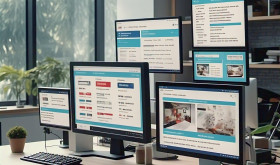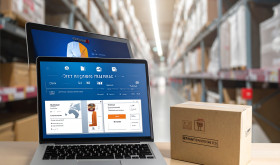
Order Management System revolutionises retail operations, enhancing customer experience and streamlining processes.
Introduction
In recent years especially during the peak of the Covid pandemic, the retail landscape has undergone a profound transformation, driven by the rapid expansion of e-commerce. This ever-evolving landscape of e-commerce is facilitating the growth of order management systems which have formed the core of success in businesses. With consumers’ expectations skyrocketing and competition heating up, businesses need to leverage innovative technologies to meet the demands of today’s digital marketplace. Simplifying the order processing and improving customer experience becomes critical during such periods. One modern technology solution that has revolutionised how e-commerce works is the Order Management System (OMS).
The Main Role of Order Management Systems in E-commerce Transformation
The intricate process of order management is the pulse of e-commerce. When a customer places an order right to the product finally delivered to the customer, there is an expectation that all the steps involved in the process have to be seamless and problem-free. This process is met by a robust and efficient OMS. Every stage from beginning to end has to be carefully managed to ensure no hiccups happen. An OMS serves as the central nervous system of an e-commerce operation, coordinating various functions such as inventory management, order processing, and fulfilment.
Understanding the Order Management Systems
An OMS is a cutting-edge sophisticated software solution that centralises and automates the execution of orders across multiple sales channels, including websites, mobile applications, and online marketplaces. It acts as a central hub that manages orders from start to finish, from ordering to fulfilment. An OMS integrates with your inventory management, Customer Relationship Management, and other systems so that you can see in real-time where your orders are, how much inventory you have, and your customer data, allowing you to run your business more efficiently and provide top-notch service. By consolidating data from multiple sources, an OMS enables retailers to make informed decisions and optimises their operations for maximum efficiency.
Streamlining Order Processing
One of the biggest advantages of an OMS is that it simplifies order processing. In the past, businesses often relied on manual or siloed systems to process orders, resulting in inefficiencies, mistakes, and delays. With an OMS, orders are captured automatically across multiple sales channels and aggregated into one platform. Not only does this centralised approach reduce the risk of errors, but it also reduces order processing times, allowing businesses to fulfil orders more quickly and accurately.
Optimising Inventory Management
An OMS helps e-commerce businesses manage inventory in real time to meet customer demand, minimise carrying costs, and avoid stockouts. An OMS helps improve inventory accuracy, improve order fulfilment rates, and improve customer satisfaction by synchronising inventory data and sales orders. By keeping inventory levels in check, an e-commerce business can avoid overstocking, avoid stockouts, and maintain optimal inventory levels.
Enhancing Customer Experience
In a highly competitive e-commerce landscape, providing outstanding customer experiences is essential for success. In fact, one of the most significant impacts of an OMS on e-commerce is the enhancement of the customer experience. An OMS plays this key role in improving customer experience by streamlining order processing, tracking orders accurately, and ensuring timely communication. An OMS makes it easy for customers to place orders, track shipments, and get updates on their order status, building trust and loyalty because retailers can fulfil orders faster and more accurately. With features like flexible shipping options and simple returns, a business can satisfy the diverse needs of its customers and encourage repeat purchases.
Enabling Omnichannel Operations
Omnichannel operations are essential in today’s world where consumers expect a seamless shopping experience across multiple channels. An OMS allows businesses to integrate and manage their orders from different sales channels, such as online stores, physical stores, or marketplaces. An OMS is able to consolidate all orders from various channels into one platform. It gives a business a single view of its inventory, orders and customers, so it can deliver consistent, personalised experiences across every touchpoint. Imagine a customer placing an order and being able to select where the order can be sent and picked up. The convenience is definitely welcomed.
Improving Operational Efficiency and Scalability
An OMS does more than just process orders and manage inventory. An OMS automates manual processes and streamlines workflows to improve overall operational efficiency. With features like order routing, automatic order allocation, intelligent order priority, and more, businesses can better allocate resources, reduce labour, and increase productivity. An OMS also provides real-time insight and analytics, allowing businesses to pinpoint weak spots, monitor KPIs, and make informed decisions to continually improve their operations. By automating repetitive tasks and streamlining workflows, an OMS allows retailers to handle a higher volume of orders without increasing overhead costs. This scalability is particularly valuable during peak periods such as holidays and sales events, where order volumes can spike dramatically.
Overcoming Implementation Challenges
Implementing an OMS does not come without challenges. Some of these challenges include integration with existing systems, data migration and staff training. However, these challenges can easily be overcome with careful planning and strategic execution. With the right resources procured by a retailer, the full benefits of implementing an OMS can be reaped.
Driving Business Growth
In the end, the value of an OMS goes beyond just improving operational efficiency. An OMS helps a business grow and succeed by improving order processing, inventory management, customer experience, omnichannel capabilities, and more. By attracting new customers, increasing sales, and expanding into new markets, a business grows and thrives. An OMS also builds long-term customer loyalty and customer satisfaction, helping a business grow and thrive in the ever-changing e-commerce environment.
Selecting the Right OMS
There are several factors that go into determining the ideal OMS for a business:
- Business Size and Needs: Consider the size of your business, the intricacy of your inventory and your long-term growth strategy.
- Features and Functionality: Make sure the OMS provides all the features you need, including multi-channel integrations, strong inventory management and reporting capabilities.
- Scalability and Flexibility: Select an OMS that can scale with your business and respond to changing requirements.
- Budget and Pricing: Understand the cost structure and select the OMS that fits your budget.
Conclusion
An OMS is the cornerstone of any e-commerce business that wants to succeed in today’s ever-evolving and highly competitive market. It centralises order processing, optimises inventory management, improves customer experience, and allows for omnichannel operation. At Y3, our cutting-edge OMS is designed to help businesses thrive in the digital age, providing unmatched functionality, scalability, and value-addition to e-commerce operations. Using Y3’s OMS, retailers can unlock new levels of efficiency, agility, and profitability, positioning themselves for long-term success in the competitive world of online retail. Y3’s OMS will transform your e-commerce business.










